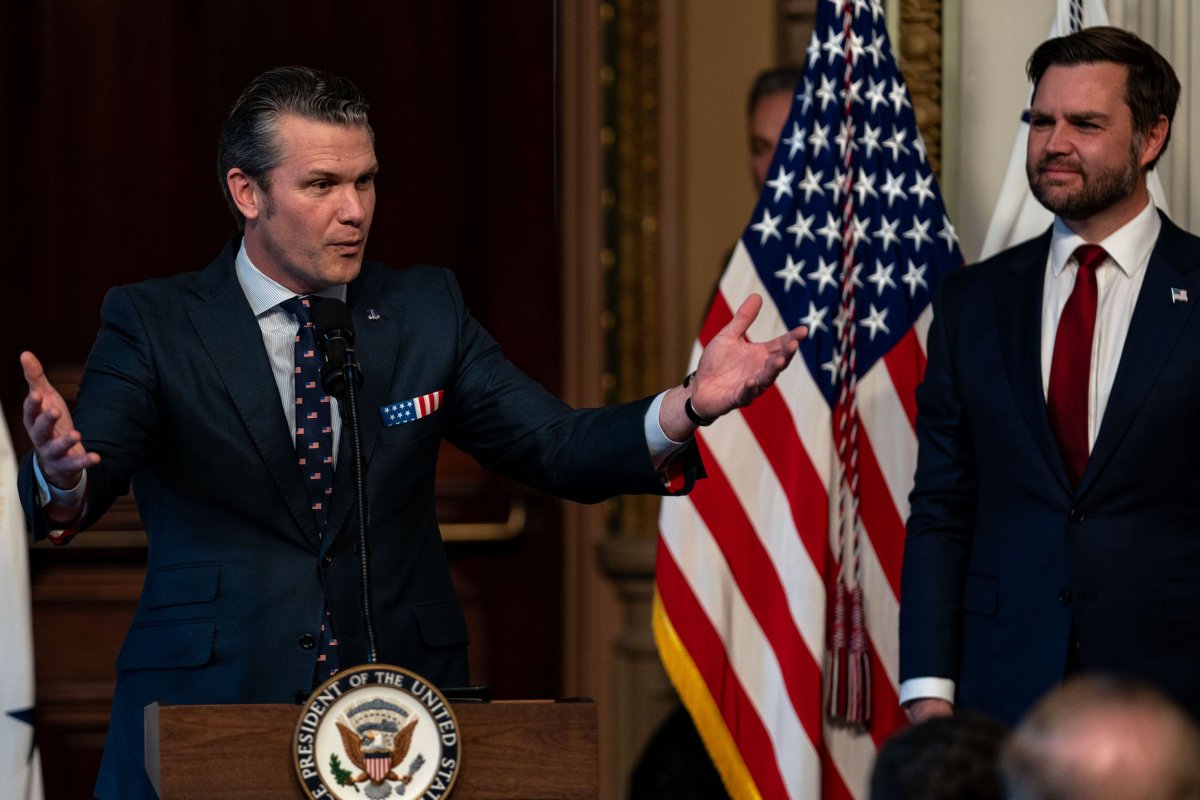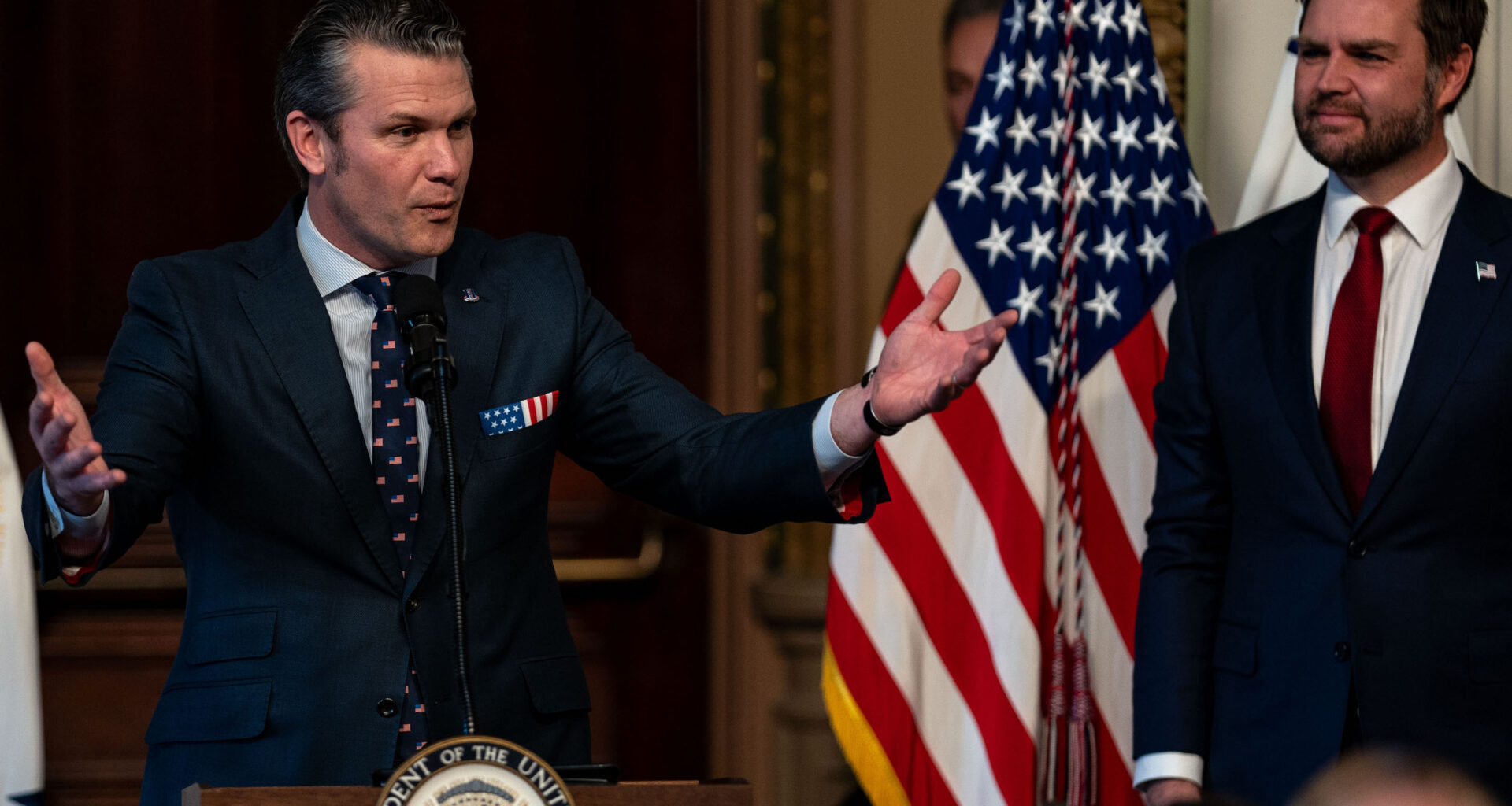The Trump administration threatens to upend the world’s most successful alliance—that was the clear message coming out of the leaked “Signalgate” chat. If Americans still want their country to lead the free world, as opposed to being just another big bully on the world stage, they will have to get a clear message across to the Republicans.
At the center of this tempest is the Trumpian disdain toward the North Atlantic Treaty Organization (NATO), and especially the European nations that are America’s main partners in that great endeavor. If examined objectively, without pettiness, NATO is a strategic bargain for the U.S. and a bulwark for the free world. It’s good for America and anyone who values democratic order over autocratic aggression. It’s bad for humanity that America, or at least its leadership, no longer does.
But Trumpworld somehow believes that America is getting a raw deal. The disdain of top officials like Vice President J.D. Vance and Defense Secretary Pete Hegseth for America’s closest allies came through loud and clear in the Signal exchange published in The Atlantic, whose editor, Jeffrey Goldberg, was an unintended invitee.
Vance actually argued against punishing the Houthis, who have impeded about a quarter of global maritime trade at devastating cost to Egypt’s Suez Canal revenues, because the Europeans use that route more than the U.S. “I just hate bailing Europe out again,” Vance wrote. Hegseth argued for the attacks, but added: “I fully share your loathing of European free-loading. It’s PATHETIC.”
There are many things wrong here, of course. The chat was unsecured—which is far worse than Hillary Clinton‘s use of a private email server. Inviting Goldberg to the chat was an act of boneheadedness that boggles the mind. The entire discussion seemed amateurish and infantile. Perhaps more damning still were the absurd lies that followed—with Hegseth denying war plans were discussed and dismissing the editor of a respected publication as a “discredited” hack. You’d think a former media personality like Hegseth would know that a lie is one thing—but a lie that could (and would) be easily exposed is especially, well, pathetic.
Luckily, these incompetents mistakenly let in a responsible senior journalist and American intellectual—not, say, a spokesman of the Houthis. Mistakes will happen. What is a little more difficult to forgive is the chat participants’ outrageous disdain toward America’s European partners in championing freedom. So the way I see it, someone should stand up for truth.
Europe is the source of the “Western Civilization” that the administration claims to be defending. It constitutes the bulk of true democracies on Earth, which the U.S. used to want to lead. Our transatlantic alliance, which Donald Trump seems to hate, has kept authoritarianism at bay for decades. On Friday, NATO will mark 76 years since its founding—in Washington.
Yes, European countries have underinvested in defense for years, and burden-sharing remains uneven. But instead of fixing NATO, MAGA seems determined to sabotage it, frequently citing numbers that are misleading. One of the most persistent myths is that the U.S. pays 70 percent of NATO’s budget. That’s flatly untrue. In 2024, the actual U.S. contribution to NATO’s common budget was just under 16 percent, and is also less than 0.1 percent of the U.S. defense budget.
What is true is that the U.S. accounts for almost 70 percent of total defense spending among NATO members. That’s not because Washington is footing the bill for Europe. It’s because the U.S. has by far the most powerful military, one that conducts activities from the Persian Gulf to the Pacific. That reflects America’s superpower status and global reach.
For its relatively meager expense on NATO, the U.S. gets quite a bit. For a tiny fraction of its defense budget, America maintains a vast network of bases, allies, and influence across Europe. These aren’t colonial outposts but partnerships built on mutual interests, allowing the U.S. to project power, deter adversaries, and shape global security without the need for war or occupation.

WASHINGTON, DC – JANUARY 25: Secretary of Defense Pete Hegseth speaks after being sworn in by U.S. Vice President J.D. Vance in the Indian Treaty Room at the Eisenhower Executive Office Building on January 25,…
WASHINGTON, DC – JANUARY 25: Secretary of Defense Pete Hegseth speaks after being sworn in by U.S. Vice President J.D. Vance in the Indian Treaty Room at the Eisenhower Executive Office Building on January 25, 2025 in Washington, DC.
More
Kent Nishimura/Getty Images
Even after the fall of the Soviet Union—the deterrence of which was NATO’s original raison d’etre—the alliance remains a firewall against authoritarianism. Russia’s invasions of Georgia in 2008, Ukraine in 2014, and again in 2022 weren’t reactions to NATO’s expansion. They were reactions to its absence. Countries like Ukraine wanted to be in NATO not to antagonize Russia, but to shield themselves from it.
NATO’s expansion could indeed be seen as a provocation, as Kremlin apologists note. But Russia probably did not react with such aggression for fear of a NATO invasion. Rather, Vladimir Putin and his cronies were aware that NATO membership is a precursor to EU membership and the freedom and prosperity that generally comes with it. Dictators who steal from their people could not have that so visible, so nearby.
That’s why NATO is so meaningful—because ultimately it fosters not imperial ambitions but democracy and freedom. Such an ambition used to be the unchallenged essence of the American experiment. Under Trump, obviously, it doesn’t mean a hill of beans. So Trump chooses to threaten the alliance, boasting that he’d “encourage” Russia to attack NATO countries that don’t pay enough, sending his minions to offend the Europeans whenever possible, and projecting an infuriating alignment with Russia.
Europeans are therefore asking: what would it look like if the U.S. actually pulled out? European NATO members might pick up the financial slack, but that’s not enough. The U.S. brings command-and-control infrastructure, cyber capabilities, strategic airlift, and real-time battlefield coordination. Without those, even a fully funded NATO would be disjointed and weakened.
The upside: All this may end up forcing Europe to finally get serious and treat defense as a primary responsibility. Defense budgets are creeping upward. Strategic discussions are turning urgent. The European Union is exploring deeper defense integration.
Two futures are possible.
In one, the GOP loses in 2028 (and is perhaps chastened in next year’s midterms) and the U.S. reaffirms its leadership of the free world. Europe becomes a stronger and more committed ally. The partnership is renewed with redoubled clarity of purpose.
In the other, the rift widens. America retreats into transactional nationalism. NATO is hollowed out. Ukraine possibly has fallen. Russia consolidates control of its near abroad. China invades Taiwan. The liberal order erodes in a slow-motion collapse. Europe is alone.
In both scenarios, one truth will remain: It will be, incredibly for the many who underestimated him, the world Trump built. Whatever the rhyme or reason, he has disrupted the most successful alliance in modern history—and created the conditions for its transformation, or decay. Swing voters: Think long and hard before the midterms.
Dan Perry is the former Cairo-based Middle East editor and London-based Europe/Africa editor of the Associated Press, the former chairman of the Foreign Press Association in Jerusalem, and the author of two books. Follow him at danperry.substack.com.
The views expressed in this article are the writer’s own.
